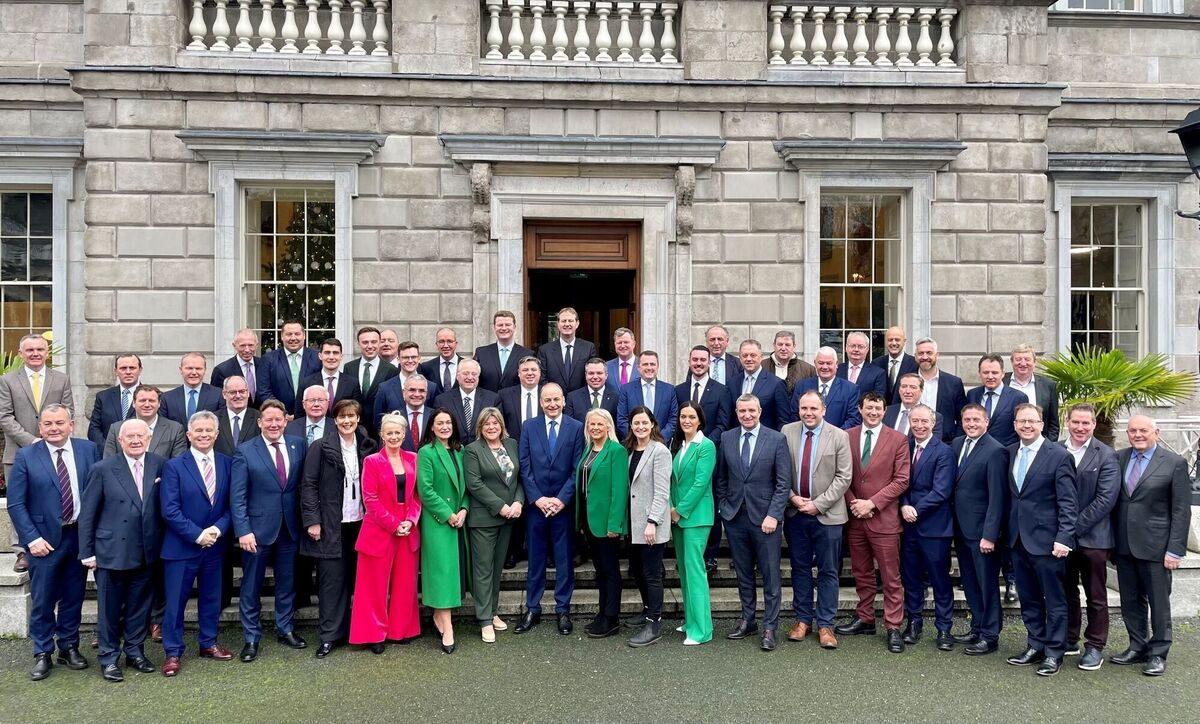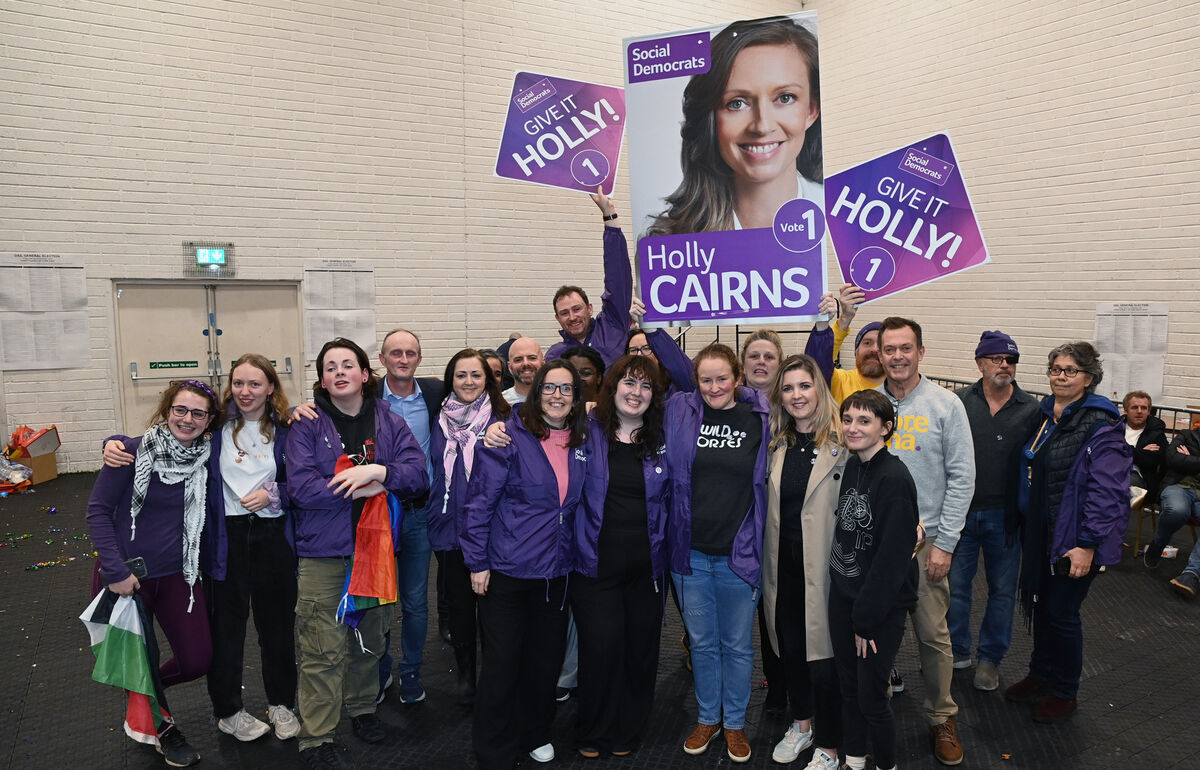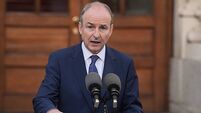Election analysis: Cork’s three party leaders have big decisions in weeks ahead

We have a history in this country of a small parties going in to government following a surge, only to lose it all as their betrayed voters leave them in droves. Picture Chani Anderson
THE chaos of the election weekend is in the rear-view mirror, and Cork’s three party leaders have some big decisions to make as the 33rd Dáil takes shape.
Fianna Fáil leader and Cork South Central TD Micheál Martin is poised to return to the taoiseach’s office, his party having won the largest number of seats. Meanwhile, Cork South West TD Holly Cairns is the leader of an 11-strong Social Democrats party that could play a crucial role in government or opposition. Her constituency colleague Michael Collins will be keeping his phone in his hand, too, as people eye up his Independent Ireland grouping for a potential deal.
In his 14 years as Fianna Fáil leader, Mr Martin has earned a reputation as a plain dealer, who will honour every agreement. The 2016 confidence-and-supply arrangement seemed bizarre on paper, but Fianna Fáil not only stood by it, but extended it for an additional year to facilitate the handling of Brexit.
The outgoing coalition was similarly by the book: Fianna Fáil stood to their word and put Fine Gael in the taoiseach’s office when their stint was up.
Earlier this year, they facilitated both of their coalition partners in changing their leader, showing that their deal was with the party, not the person. Any past Fianna Fáil leader would have ruthlessly taken advantage of those opportunities, but whether or not you like Mr Martin, his party, or his policies, with the current Fianna Fáil what you see is what you get.
Like his bus-driver father, Mr Martin is now sitting at the wheel, but on the journey to a coalition, and his first stop is obvious.
Between them, Fine Gael and Fianna Fáil have 86 seats, just two off a bare majority in the 174-seat Dáil. While there is a particular mating ritual they must adhere to in the coming weeks, the eventual union seems certain.

Looking at the numbers, this election was an endorsement of the 2020 decision to finally ‘end the Civil War’.
Both Fianna Fáil and Fine Gael came in at about exactly the same share of first-preference votes as they did five years ago. Essentially, anyone who voted for them in 2020 was happy to do so again.
And, no surprise to anyone, they actually got on. For years, people have been saying they were two cheeks of the same…ahem, two sides of the same coin.
While they might have differences in emphasis when balancing tax cuts and spending increases, the two parties share the same broad political ideology.
They have worked together for almost five years, so there’s no learning curve, no surprises, and a new coalition would look more like a Cabinet reshuffle and could hit the ground running early next year.
There will be sticking points. With a 10-seat lead, will Mr Martin be in a position to take a rotating taoiseach off the table? And if he can’t, what demands will he have to show Fianna Fáil’s strength and what demands will Fine Gael leader Simon Harris have to ensure the ‘parity of esteem’ he has mentioned in recent days?
But practicality will trump politics and a deal will be struck.
The real problem is those last two seats.
If there were a small party of five or six seats in the mix, a real expression of interest could be made, but with the only real options being the 11-strong Labour and Social Democrats, the price might be too high.
Any potential taoiseach has a few things to consider with assembling a coalition: Compatibility and any major policy conflicts; personality and how well people will get on; stability and how likely the arrangement is to last.
But just as important are the spoils of war.

When Fine Gael and Fianna Fáil brought the Greens in to their historic coalition in 2020, the price was high. With just 11 TDs, the Greens received three senior Cabinet posts, four ministers of state with one attending Cabinet, two of the taoiseach’s Seanad appointees, and huge concessions in the programme for government.
At various points of the last Dáil, multiple Greens threatened to go rogue over issues like the overturning of the eviction ban and the sealing of the records of mother-and-baby homes.
The Greens’s climate-forward policies also had a political cost, with Fine Gael and Fianna Fáil struggling to sell things like carbon taxes and turf bans to voters already squeezed by inflation.
In the new Dáil, a straight majority between Fianna Fáil and Fine Gael is agonisingly close, and there could be real resistance from backbenchers if their leaders start offering away the jobs that they could have taken, while saddling them with policies they can’t sell on the doors.
In a scenario like that, Mr Martin’s first call might not be to Ms Cairns, but to Mr Collins.
As they say about independents: Once they’re ‘bought they stay bought’. Independent-supported governments have been pretty stable in recent decades, as long as the big parties have kept their promises on any local projects or issues they have agreed to support. Independents don’t tend to ask for ministerial appointments or major policy concessions. They’re going to be looking for investment in local hospitals, roads projects, or Garda stations.
Independents also seem to pay less of a political price by supporting a government, compared to small parties. A small-party TD will be punished by ideological voters for backing a policy that they don’t support. But voters will more easily turn a blind eye to an independent TD who has secured a bridge here and a bypass there.
Independent Ireland are certainly an option, but the dynamics of dealing with them are unclear. While they are formally a party, in reality they are a loose grouping whose strategic interests just happen to align.
The clue is in the name, and that means Mr Martin can’t just cut a deal with Mr Collins, but needs to deal directly with Independents like Kenneth O’Flynn, Richard O’Donoghue, and Michael Fitzmaurice.
A two-seat majority like that would also hand the balance of power to very few people, so options would have to be explored to pad out the numbers with anyone from Michael Lowry and Mattie McGrath, in Tipperary, to the Healy-Raes in Kerry. Or it could be the case that those TDs and a number of others will get a knock on the door, excluding Independent Ireland.

Independents have made it clear that their door is open, but the Social Democrats have been more coy. After welcoming a daughter on election day, Ms Cairns has been off the stage, while navigating the coalition debate via her deputy, Cian O’Callaghan, and other representatives. There was huge energy behind the party in this election, and that has come with a huge spotlight.
In recent days, the party’s TDs have tried to walk a careful line and show that they are ready for government, but that the current government isn’t ready for them.
They have repeated the five redlines they repeated throughout the campaign regarding housing, Sláintecare, climate, disability, and childcare, if only to show how big the gap is between their goals and the record of Fianna Fáil and Fine Gael.
We have a history in this country of a small parties going in to government following a surge, only to lose it all as their betrayed voters leave them in droves.
The Social Democrats, less than a decade old, must be acutely aware of the soft foundations on which their support in this election was built.
While changemakers are impatient, five years spent building critical mass in opposition could allow them to make far more of an impact in the future, especially if a broad left alternative can emerge.
But they can’t miss the opportunity that’s available to them by posturing. In the coming weeks, should they choose to exit talks, they can make a show of their principled stand on their redlines as their next phase begins. And if they are the ones being rejected, they can say that the Fianna Fáil and Fine Gael have rejected affordable housing and childcare, climate action, integrated care, and disability rights.
With Christmas rapidly approaching, the chances of a new government being formed in 2024 are slim, but don’t expect a months-long process like 2016 or 2020.
The maths are simple and the challenges are clear, it will just take a bit of hard work to get something over the line.
And, with the people involved, you can rest easy that whatever happens, Cork will be at the centre of it all.










 App?
App?


